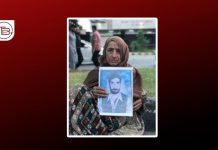By Yaran Diyar
Pakistan’s Apex Committee has approved a “comprehensive military operation” against Baloch “pro-independence” groups in Balochistan following a series of deadly attacks on Chinese nationals working in Pakistan and on members of the Pakistani armed forces.
According to TBP correspondents, the operation had already begun a few days earlier, but after the official approval of the Apex Committee, the military movements have increased in various parts of Balochistan.
Neither the Pakistan Prime Minister’s Office nor the military has provided details about the scope of the operation, including whether it will involve ground or air strikes or any collaboration with China.
The announcement coincides with preparations for Pakistan and China’s first joint counter-terrorism drills in five years. The exercises, named “Warrior 8,” are scheduled to take place between late November and mid-December 2024.
The announcement of the operation has been met with criticism from human rights groups, political leaders, and students across the country. They fear that the use of force will further exacerbate Balochistan’s longstanding political issue and are concerned that civilians will bear the brunt of these military operations, given the history of “indiscriminate” military operations by Pakistan’s armed forces in the region.
HRCP’s Concern Over Military Escalation
The Human Rights Commission of Pakistan (HRCP) has expressed profound concern regarding the escalating military operations in Balochistan. In its latest statement, the HRCP emphasised that the resolution to the ongoing insurgency and violence in the province lies in initiating comprehensive and decisive political negotiations that involve all relevant stakeholders.
The HRCP warned against the state’s increasing reliance on military action to resolve the conflict. The organisation highlighted that similar operations in the past have not only failed to deliver meaningful results but have also exacerbated the anger and mistrust among local communities. The lack of transparency and civilian oversight in such actions has led to widespread human rights violations, the HRCP noted, urging the government to uphold the constitutional and legal rights of Baloch citizens under all circumstances.
Jamiat Ulema-e-Islam’s Criticism of Security Measures
Jamiat Ulema-e-Islam’s (JUI) provincial leader, Maulana Wasey, voiced alarm over the intensifying wave of terrorism in Balochistan over the past few months. Addressing a press conference, he highlighted incidents such as targeted bombings and attacks on coal mines, which have claimed numerous lives. According to Wasey, security forces have been unable to control the deteriorating situation despite significant allocations for maintaining law and order.
The JUI leader condemned raids on religious seminaries, which he described as unconstitutional and unethical. He warned that these actions could provoke significant backlash and indicated the potential for a protest movement if such measures persisted. Wasey also strongly opposed military operations, pressing that these measures would only worsen the already volatile conditions in Balochistan.
Former Chief Minister’s Advocacy for Dialogue
Former Chief Minister Dr Abdul Malik Baloch, a prominent leader of the National Party, reiterated his opposition to military solutions for Balochistan’s issues. Reflecting on his tenure, he mentioned that negotiations with separatist groups had reached an 80% success rate before being abruptly halted.
Speaking to international media, Dr Baloch questioned the efficacy of decades-long military operations, pointing out that past campaigns had failed to yield positive outcomes. He urged the state to adopt a dialogue-based approach, fostering trust between the government and Baloch citizens instead of further alienating the population through coercive measures.
BNP’s Rejection of Military Operations
The Balochistan National Party (BNP) also condemned the newly announced military campaign. Party member Ghulam Nabi Marri criticised the government for resorting to force instead of prioritising reconciliation with local stakeholders. He highlighted that this marks the sixth military operation in Balochistan since Pakistan’s independence, all of which have left lasting scars on the province’s socio-political landscape.
Marri added that forced disappearances and other oppressive tactics had eroded public trust in parliamentary processes and elections, pushing many towards political disillusionment. He urged the state to recognise the damage caused by these policies and shift towards a more inclusive and humane approach to addressing the province’s grievances.
BSO-Azad’s Call for Resistance and Education
The Baloch Students Organisation-Azad (BSO-Azad) has accused the state of intensifying its military campaign under the guise of counter-terrorism, describing it as an orchestrated effort to suppress the Baloch national movement. The organisation alleged that the security forces, with international backing, are committing grave human rights violations, including abductions, extrajudicial killings, and collective punishment.
The BSO-Azad called on Baloch youth to focus on practical education to strengthen their movement and resist state oppression. It also criticised the state for imposing internet blackouts and communication restrictions, viewing these measures as attempts to conceal atrocities from the global community.
Concerns from Baloch Human Rights Activists
Prominent Baloch human rights activist Dr Mahrang Baloch expressed deep reservations over the renewed military operations, stating that Balochistan’s deteriorating security situation is itself a result of prolonged reliance on force. She highlighted that entire villages have been displaced over the years, pushing locals towards joining armed resistance movements. Mahrang warned that further military operations would only lead to greater unrest and a loss of innocent lives.
Student leader and activist Sabiha Baloch also voiced similar concerns, stating that military actions often result in indiscriminate harm to civilians. She criticised the lack of judicial or political accountability during these operations, questioning who would ensure that the innocent are protected.
Sabiha stressed the importance of shifting away from an overgeneralised policy targeting entire communities. Instead, she advocated for focused operations against violent actors under judicial and political oversight. She emphasised the need for genuine Baloch leadership to emerge and called for transparent democratic mechanisms to allow locals to elect their representatives freely.
The Human Rights Council of Balochistan (HRCB) described the operation as a continuation of “oppressive policies.” “This militarized approach has consistently failed to address the province’s fundamental issues,” the group said. HRCB reported military deployments, aerial bombardments, and shelling of civilian areas in districts such as Nushki, Panjgur, and Bolan, adding that these actions endanger civilian lives.
The HRCB also criticized the suspension of internet services across large parts of Balochistan, warning that the blackout isolates communities and hinders documentation of human rights abuses.
Paank, the human rights wing of the Baloch National Movement (BNM), condemned the operation and warned of widespread civilian suffering. “Combat helicopters have been targeting civilian areas in Nushki for the past two days, while intense shelling is being carried out in Dera Bugti’s Lop Sehrani and Chabdar regions, destroying homes and endangering lives,” Paank said in a statement.
The group accused the government of suppressing the Baloch people’s legitimate struggle for self-determination. “Decades of enforced disappearances, extrajudicial killings, and violent crackdowns have only deepened the resistance of the Baloch people,” it added.
The Conflict in Balochistan
The resource-rich region of Balochistan has been a focal point of conflict since 1948, which, according to Baloch nationalists, is the year when Pakistan “illegally occupied the largest part of Balochistan by force.” The remainder of the region is currently under Iran and Afghanistan’s administration. The region’s grievances stem from issues such as political marginalisation, inadequate economic development, and exploitation of natural resources without local participation. Several Baloch “pro-independence” groups have emerged over the decades, demanding autonomy or independence
The state of Pakistan has launched multiple military operations in response to insurgencies beginning in the 1950s. The latest military campaign is part of a broader strategy to quell dissent and secure the province, especially given its strategic importance in projects like the China-Pakistan Economic Corridor (CPEC). Critics argue that these operations have deepened mistrust between the state and the local population, often resulting in significant civilian casualties and allegations of human rights abuses.
Local activists, political leaders, and human rights organisations have repeatedly called for a shift in strategy towards dialogue and reconciliation. They argue that reliance on force alone will continue to fuel instability, and only a transparent, inclusive political process can pave the way for lasting peace in Balochistan.






























